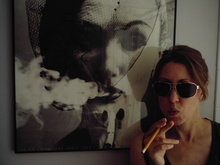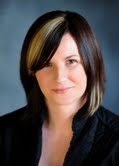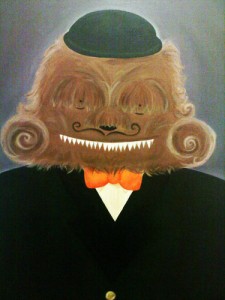 Susan Tepper: Foster, your story “Moon View Mountain Road” is a strange and interesting tale with a compelling title. From the title, and then your first line: I once read a book of warnings — I’d say it’s fairly certain that we’re in for a dark ride. What about this title? How did the title come, did you choose it first or did it come to you during the writing or even after?
Susan Tepper: Foster, your story “Moon View Mountain Road” is a strange and interesting tale with a compelling title. From the title, and then your first line: I once read a book of warnings — I’d say it’s fairly certain that we’re in for a dark ride. What about this title? How did the title come, did you choose it first or did it come to you during the writing or even after?
Foster Trecost: Hi Susan. Titles are the hardest thing I write and they always come last. I can bang out 500 words in no time, but a five word title could take days or more and I’m still never happy with what I come up with. Such was the case with “Moon View Mountain Road,” so I did what I usually do — I borrowed a phrase from the story, and this wasn’t even my first choice. I liked “The Book of Warnings” better, but I didn’t like the way it would have been repeated in the opening line. I wanted something ominous and this, paired with the first line, seemed ominous enough to me. Titles give me so much trouble, I’ve thought of numbering my stories instead, but then everyone would see how unfruitful I am. Maybe I’m just lazy.
ST: Well based on this story you don’t strike me as a lazy writer — far from it! Perhaps more a self-effacing writer would describe you. Refreshing! Well in any case, the “warnings” that you peppered throughout the narrative are amazing little bits of almost poetic bible-speak. They push the narrative hard. Your second warning reads: Do not lose beauty in everydayness, for to be surrounded by unnoticed beauty is to live in its absence. Is this also part of your own personal belief system? Because the story, to me, felt intensely personal on many levels.
FT: I think you’re on to me! Most of my stories are very personal and this one certainly is, but I feel like I can hide behind the fiction, reveal without revealing. Some writers are so good, so creative, that they can just invent everything. The best I can do is invent some things (but I did invent the ending of this story!). Maybe it’s a balance – I’m private in person, but still feel a need to put things out there. Maybe this is how I do it. I enjoyed coming up with the warnings and I’ve been asked if they came from a real book: nope, these are mine. And I think beauty should be appreciated and sometimes that means taking the time to find it.
ST: Ah ha! So, I’m onto you! Well, that’s cool. As for you hiding behind the fiction, you do it very well. I never pictured you as the narrator, but I saw the “warnings” plus the narrator’s affinity with nature as coming from within the author. These warnings you wrote have an obsessive quality, even the purest of them. It’s been said /written that for a story to be successful, there must be an obsession that runs through like a red thread. Did you consciously try for that obsession in the writing or did it come out of your unconscious mind?
FT: Susan, when I write a story, it happens so fast that I don’t think there’s much time for obsession. OR, it happens so fast because it’s based on an obsession. I’m not sure which, if either, but I think there’s truth in what you said. I like that you picked up on the nature component, because that’s an example of something that came out without me realizing it – makes me wonder what else gets written by my unconscious mind. Hmmmmm, I think I’ll be reading through my stories in a bit.
ST: Foster, SEX. This story is clearly about sex. And love, I guess, or at least what the narrator perceives as love. You write: “She had become bored with me, but found it easier to say she had become bored with the moon. We stopped talking [Do not speak with your silence, for it will say things unintended.] We stopped everything. Earlier that day, I pleaded for her return and suggested we take a drive.”
This is such a lyrical way of expressing her waning (moon?) feelings toward him. And a big transition point in the story. Did you know at this point the startling turn the story would take?
FT: Oh, dear. I wasn’t aware of that…
In the beginning, I wasn’t sure where this story was headed, but as I’m writing, I’m trying to feel what the narrator was feeling, trying to be him and write what I think he might do. Believe me, there were alternatives, alternate endings, but this one made the most sense (which I find troubling). By the time I reached this point, it had become clear that this would be a very dark tale. I never set out to write such a story, but I felt good about the ending, which is to say I felt it wasn’t too far-fetched, that it could really happen.
ST: You’ve been extremely open and generous in allowing me to probe your mind, Foster. And this is such a mind-story! I’ll finish by quoting another of your amazing warnings: [Do not ask questions unless you are prepared for the answers, for the truth often hurts.]
Did you find the answers you were seeking in the writing of this story? You can just answer YES or NO. Or MAYBE.
FT: YES, but I think this chat asked more questions than just the ones you posed, and I guess I’ll be thinking about their answers for quite some time.
Susan, thank you so much for including me in this series.
Read “Moon View Mountain Road” by Foster Trecost
Monday Chat is a bi-weekly series in which Susan Tepper has a conversation with a Fictionaut writer about one of his or her stories. Susan is Assistant Editor of Istanbul Literary Review and hosts FIZZ, a reading series at KGB Bar.

 Q (
Q ( Irish-born
Irish-born 
